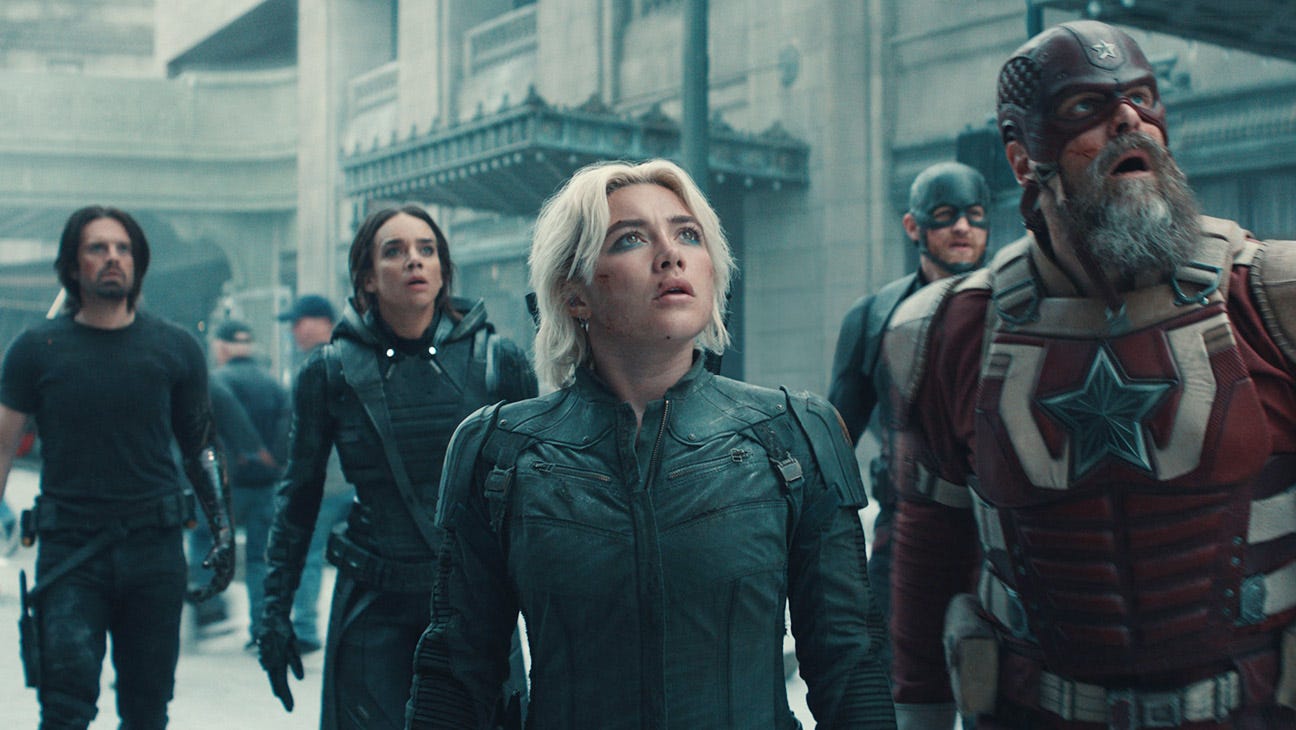I had no idea what to expect from Marvel’s latest film, Thunderbolts*. Frankly, I have not really followed the MCU closely since Endgame. The MCU ended perfectly for me and I was satisfied with how Endgame, well, ended. Since then, I have only seen three MCU films (Deadpool & Wolverine, No Way Home, and Multiverse of Madness) and I have not seen any of the shows that have premiered on Disney+. However, lately, I have been getting more interested in what the MCU has been up to – especially with the cast announcement for Avengers: Doomsday, the trailers for the new Fantastic Four film, and the reprisal of Daredevil. When I happened to see that Thunderbolts* was showing while I had a free afternoon, I decided that I would buy a ticket and see what the new addition to the MCU was all about.
One aspect of Thunderbolts* that became quickly apparent was how much the film relies on your past knowledge of the MCU. It’s not a movie that one can jump into without knowing the context of who its characters are. As a warning and for much needed context, one needs to have seen Black Widow and The Falcon and the Winter Soldier in order to fully appreciate the film. Thankfully, I had seen Black Widow before and knew about Yelena (Florence Pugh), who is essentially the main character, and Alexei (David Harbour). However, since I had not seen The Falcon and the Winter Soldier, I did not know about other characters like John Walker (Wyatt Russell) and Valentina de Fontaine (Julia Louis-Dreyfus). Thunderbolts* inserts these characters into the narrative without feeling the need to introduce them to the audience outside of maybe a few brief remarks from a different character. Thus, if you have not been following the MCU for a while, it will probably be difficult to jump in and understand what is going on.
Thunderbolts* is a very interesting MCU film because it has a lot of old, worn out superhero tropes while also saying something new about pain and grief that I’ve never seen in a superhero film. With as little spoilers as possible, Thunderbolts* clichés show a corrupt organization that is led by an evil CEO who is trying to re-create Captain America’s super soldier serum. This organization wants to supply the US government with super soldiers who can defend America and the world from extra-terrestrial threats so that they can gain more riches and power on a global stage. Surprisingly, one of the test subjects discovers that the super soldier serum works and everything goes downhill from there. Thus, our heroes, who have been thrown into a situation beyond their control, decide that it is up to them to save the day. Thunderbolts* main plot points have been oversaturated within the superhero genre for over twenty years. However, Thunderbolts* succeeds at showing how pain and suffering can be overcome.
Thunderbolts* opens with a monologue from Yelena in which she expresses her sorrowful disposition and she laments at how difficult it is for her to move on after the death of her sister, Natasha. The film follows her struggles with her grief and how she tries to move beyond it. As Thunderbolts* progresses, we that she tries to deal with her grief by not acknowledging it and forcing herself into her work. As Thunderbolts* progresses, she discovers that the only way she can move on and deal with her grief is relying on those around her. While this is not a novel concept, it is a striking turn from what the MCU has done recently. Thunderbolts* has emotional depth and takes it characters seriously.
While it still has its basic Marvel tropes such as fun quips and light-hearted character beats which Marvel films are known for, Thunderbolts* does something akin to the earlier installments of the MCU: it allows its emotional character moments time to breath and develop. Thunderbolts* does not undermine its impactful moments with a funny one-liner or some gimmick gag. The film actually respects the audience and its characters and gives both time to unpack its emotionally charged scenes. For example, instead of making light of Yelena’s grief towards the finale, the film slows down and allows her father, Alexei, to console her in a beautiful father-daughter moment. This particular change in Marvel’s approach to these moments not only allows the audience to process what they’ve seen but also allows the audience to emotionally connect with the characters which is a very welcome change of pace for the MCU.
In the end, Thunderbolts* is a film about not allowing dark thoughts and feelings – such as grief and depression – overwhelm you in times of loneliness. It can be easy to give in and not confront these feelings and instead allow them to envelope your soul. Not allowing oneself to be completely swallowed by despair and fall into the void (as its described in the film), is a very relatable struggle and is one that the film portrays really well. Thunderbolts*, however, provides the audience with a solution: one can climb out of that deadly spiral by not giving in and surrounding oneself with friends and family who truly care about you and that searching for fellowship will help you escape a spiral into despair. The artistry behind the climax of the film is done very well and definitely worth seeing in theaters. While certainly not Marvel’s best, it is a step in the right direction for the MCU as it (hopefully) pivots from theme park rides to cinematic experiences.






